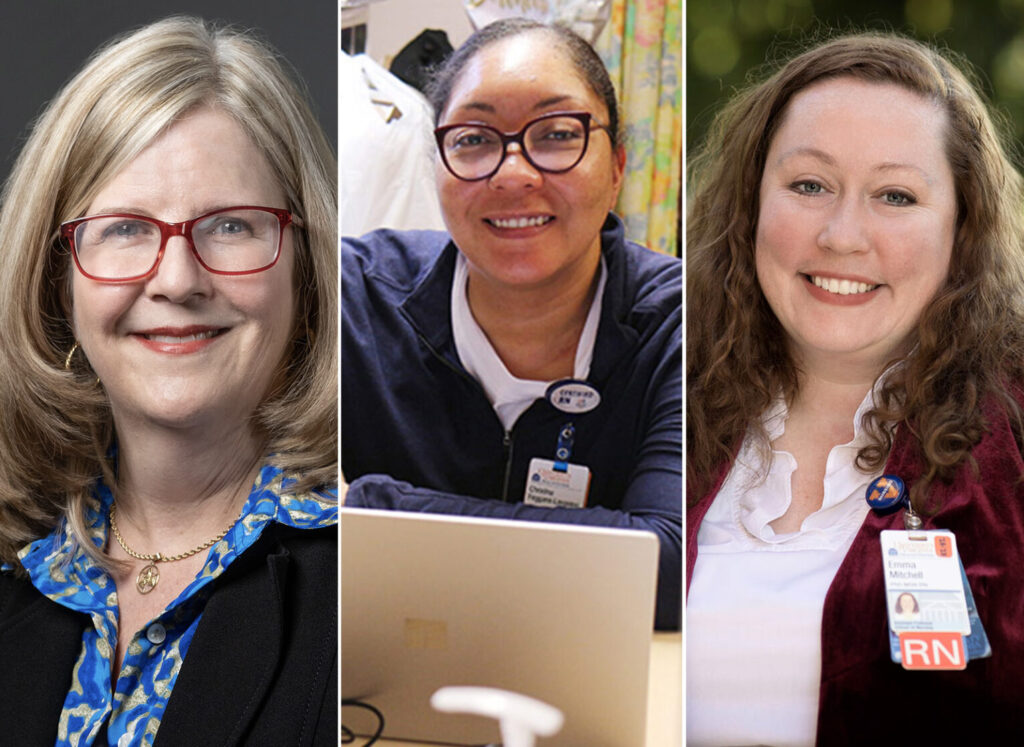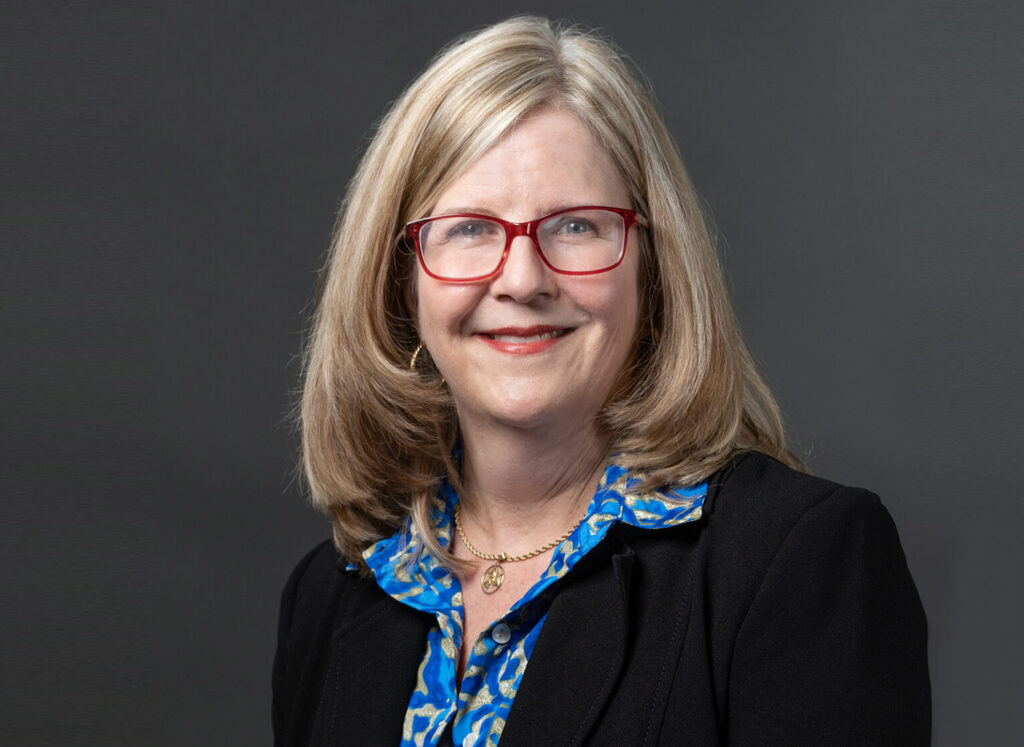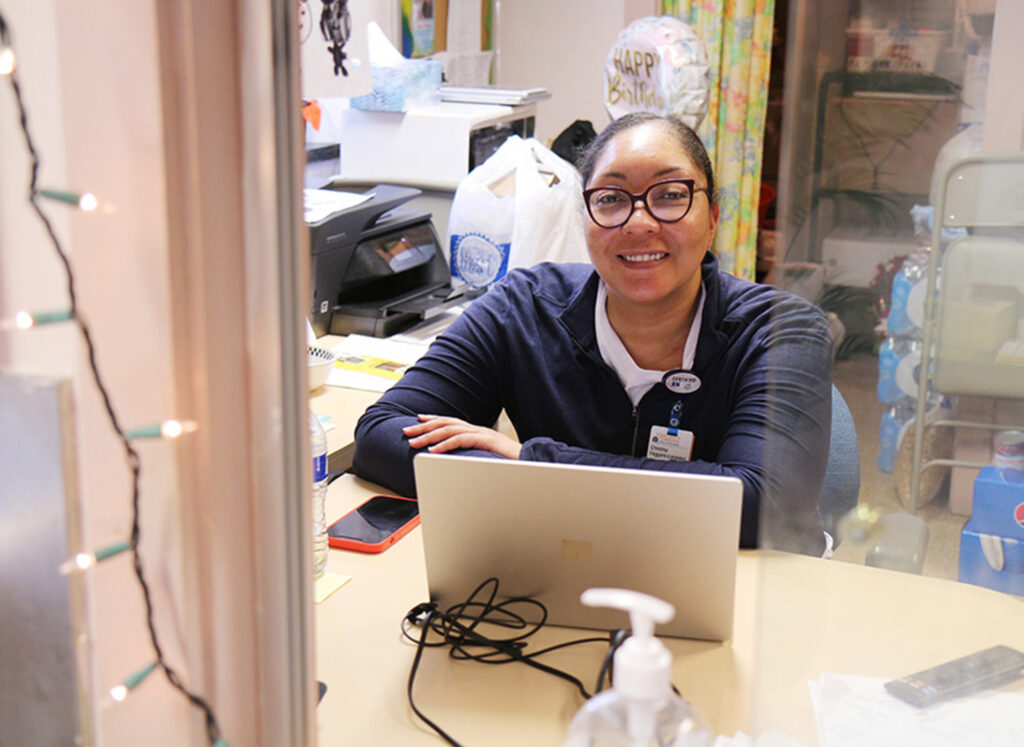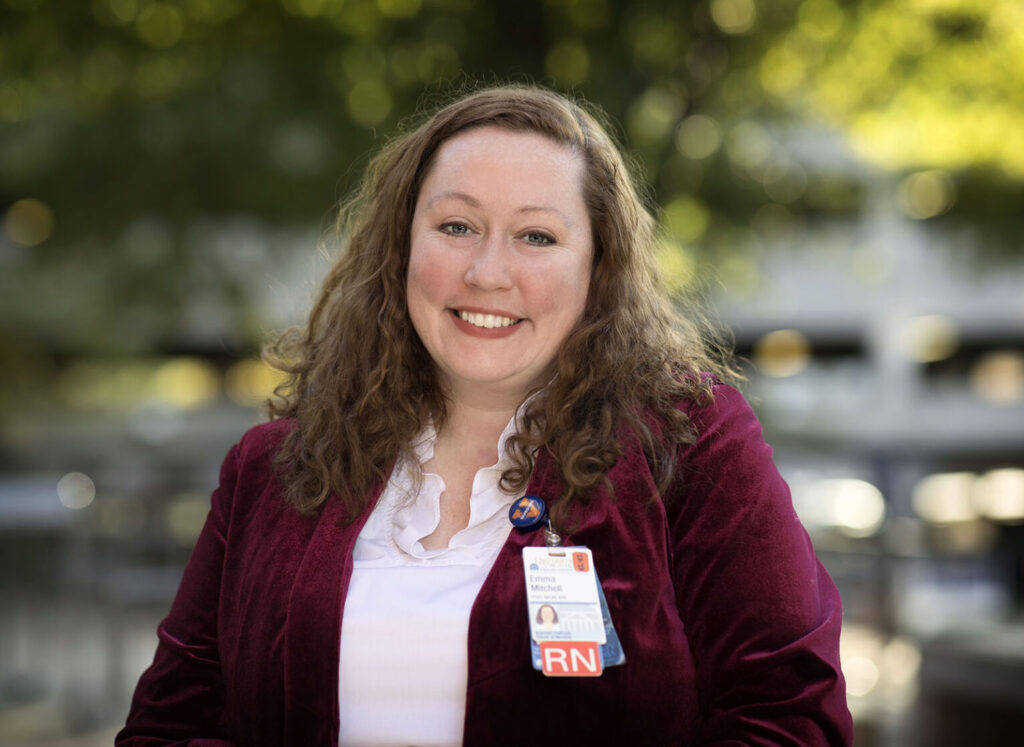
Dear Colleagues:
Today marks International Women’s Day (March 8) and our official launch of Women’s History Month at UVA Health. This is one of our favorite times of year — a time for celebrating women and their achievements, here at UVA Health and around the world. There have been countless efforts in the last century to address equity in all corners of the world for women and women’s rights. While we have made progress in striving toward a less-biased world, we continue to embrace equity as our theme for Women’s History Month in March 2023.
The day also marks a call to action to accelerate equity for all who identify as women. One of the missions of International Women’s Day is to promote women’s health — a mission obviously near and dear to all of us at UVA Health. We strive to make a positive difference for women in our health environments: whether for our team members or for patients in our care.
Though words are a powerful motivator for change, actions speak louder; at UVA Health, there are many examples of women whose actions are forging new frontiers in healthcare to address equity in our community and beyond. Today, we highlight three unsung heroes whose undying commitment to improving women’s and our local community’s health is bettering the lives of many across our UVA Health community. These women prove the possibility of change and the importance of accountability in our modern healthcare system, whether it’s expanding our standards of excellence, cultivating community and belonging, or delivering better health outcomes.
Today we spotlight Jennifer L. Payne, MD, whose life’s work and passion is fighting to end stigma around mental health illness. As Professor and Vice Chair of Research Department of Psychiatry and Neurobehavioral Sciences, Dr. Payne researches the connection between pregnancy and depression in order to reveal unique challenges individuals with mental illness face in their pregnancy journeys.
Jennifer L. Payne, MD
Dr. Payne joined UVA Health in 2021 and is making an impact on our strategic goal of expanding our excellence and enabling discoveries for better health. Read on to learn more about Dr. Payne’s unique perspective of what UVA Health can do to better embrace equity.
Why did you become a doctor?
Payne: I joined the UVA Neuroscience Program right after undergrad thinking I was going to get a PhD in neuroscience; however, I became extremely allergic to rats! Based on some of the medical school classes that were part of my program, I decided that medical school was going to be a better, and healthier, fit for me. I never lost my love of research, and so I became a clinical researcher instead of a basic scientist, giving me a chance to help the individuals that I treat, and to affect the whole population of patients and the standard of care through research.
What challenges did you face, if any, being a women physician?
Payne: There have been several challenges from not being taken seriously to inappropriate comments directed at me. The biggest challenge, however, has always been balancing family and work. I had to constantly reassess how to best balance all my roles in order to meet everybody’s needs including my own. At times, work took the front seat and other times my family did. It was important for me to think clearly about priorities and roles on an almost daily basis.
What are you most proud of since joining UVA Health?
Payne: It was incredibly meaningful to me to receive the teaching award from the Psychiatry residents less than a year after joining the UVA faculty! I’m also proud of my research team: Meeta Pangtey, MPH; Lauren Williamson, PhD; and Kayla Pennycuff, BS, who make up the Reproductive Psychiatry Research Program and are Clinical Research Coordinators. They are awesome!
Who were some of your earliest women role models?
Payne: My earliest role model was Dr. Madeline Harrison in Neurology here at UVA. I worked for her for a year after deciding to go to medical school. She was a neurologist, an excellent mother, and a scientist. She inspired me more than she will ever know!
Is there a particular woman or women you admire today?
Payne: One woman I really admire is Kathie Wisner, MD, who started the field of reproductive psychiatry. Dr. Wisner is also a clinician, clinical researcher, and a mom and she’s always given me great advice! As a pioneer in researching postpartum depression and the management of psychiatric disorders during pregnancy, Dr. Wisner has made a huge impact on our field.
What more can we be doing as a health system to embrace equity?
Payne: We need to recognize that equity addresses a whole host of different factors that aren’t limited to gender or race. For example, patients with psychiatric disorders often receive suboptimal medical care because their concerns are dismissed due to the perception that their complaints are secondary to their mental illness. The reality is that most physicians either treat patients with psychiatric illness or need to address psychiatric aspects of other illnesses; and many of our front-line physicians need to address psychiatric illness directly because there are not enough mental health providers. As a health system that wants to embrace equity we need to have more conversations about the overlap of psychiatric care and medical care and make sure that all UVA Health providers are adequately trained to address mental health.
How does your research impact our strategic goal of “Expanding our Excellence and Enabling Discoveries for Better Health?”
Payne: One of my research studies has identified two epigenetic biomarkers that can predict with about 80 percent accuracy who will develop postpartum depression. These biomarkers have been replicated several times and I’m working with a small start-up company to try to make the biomarker test commercially available. My dream is to change the standard of care and to make the blood test available to all pregnant women during their third trimester. If a woman is identified by the test as being at high risk, their clinician can help them to prevent onset of this potentially devastating psychiatric illness. Postpartum depression is the most common complication of childbirth, and suicide is one of the leading causes of death in the year after delivery. Preventing postpartum depression would truly be “expanding our excellence!”

We also spotlight two team members who are working to cultivate healthy communities, belonging for all, and health equity, both in Virginia and across the world. As the new clinical instructor and nurse for our local Westhaven community, Christina Feggans-Langston, BSN, MSN, writes: “To me, this job isn’t just about having a body in a position: It’s having someone who looks like you and truly knows and is comfortable with this community. I’ve come full circle.”
Christina Feggans-Langston, BSN, MSN
Article written by Christine Kueter, Senior Writer and Editor, UVA School of Nursing
In elementary school, Christina Feggans-Langston remembers abandoning the bus stop outside her house for the one three blocks away in the public housing complex at Westhaven. The swap made sense: her friends were there, it was livelier, more fun, and always encircled by a protective layer of grownups and extended family members she knew well.
Today, as she returns to Westhaven as the community’s new clinic nurse and a clinical instructor at the School of Nursing, the place still feels like home.
“This community is a hidden gem,” Feggans-Langston said of the 60-year-old community. “There’s so much talent here, so much history, so many stories. I’m glad to be back.”
Feggan-Langston’s return comes after a circuitous journey of her own. She first attended college planning to teach, but found herself at odds with certain educational staples, like the SOLs. After becoming a certified medical assistant, she was inspired by the nurses around her to return to school for a third time to earn a BSN, and then an MSN. Since then, she’s cared for patients at UVA’s Transplant Clinic and, later on, at its Infectious Diseases Clinic.
During those years, she loved it when she ran into old friends, their parents, and grandparents, many of whom still lived in Westhaven, which lies just a few short blocks from UVA’s Grounds. So, when a job opened up for a clinic nurse (after the retirement of award-winning assistant professor Sharon Veith was announced last year), Feggans-Langston leapt again.
“I grew up three blocks away,” she said. “To me, this job isn’t just about having a body in a position: it’s having someone who looks like you and truly knows and is comfortable with this community. I’ve come full circle.”
Top of mind in her new role, as she reconnects with old friends and mentors nursing students on their community and public health clinical rotations, is ensuring the clinic operates in a trustworthy and transparent fashion. That it feels safe, confidential, useful, warm.
In her health promotion and primary prevention work, Feggans-Langston, along with her clinic coordinator colleague Shelly Bryant, act as “connectors": doing home visits and nursing assessments, giving residents rides to medical appointments, helping with medication, and offering supplies in a pinch, like condoms, toilet paper, grocery cards, diapers, as well as company to those who stop in — work that hearkens back to the efforts of Black public health nurses throughout history.
With Bryant and community partners from Charlottesville’s Redevelopment and Housing Authority, the Public Housing Association of Residents (PHAR), and the City of Promise, among others, Feggans-Langston hopes to expand clinic offerings, too: a visiting NP for spring sports physicals, new mothers’ and mental health support groups, HIV- and hepatitis-C testing, vaccine clinics, first aid training, even help with meal planning. Schooled in trauma-informed care, Feggans-Langston’s approach is careful, warm, holistic. She’ll encourage her students to do the same.
“Nursing assessments aren’t always physical,” said Feggans-Langston. “If it’s a general assessment outside of a physical ailment, I’ll ask, ‘How are your meals? Are you warm enough? Any trouble paying for medications? Is there anything outside your health that’s bothering you?’”
Navigating health issues on top of work and home life can be tricky, Feggans-Langston acknowledged, “like putting together pieces of a puzzle."
It’s why, as she reconnects with old friends, Feggans-Langston — herself a mother to two teenage boys — reminds Westhaven residents: “I’m here. I want to be a resource. My door is always open. I’m telling everybody: please, just come.”
###
The Westhaven Nursing Clinic is supported by the Charlottesville City Department of Human Services and Community Attention, Charlottesville Redevelopment and Housing Authority, the Public Housing Association of Residents, UVA Health, the Legal Aid Center, City of Promise, Sentara Martha Jefferson Hospital, and the UVA School of Nursing.

Nearly 2,000 miles away, in Bluefields, Nicaragua, research by Emma M. Mitchell, PhD, MSN, RN, shows the international importance of community as a means for increasing equity for women. Dr. Mitchell, Associate Professor of Nursing and Director of Global Initiatives, is improving health outcomes for those at risk of cervical cancer, engaging the community through an app in a journey toward equitable healthcare access for all.
Emma M. Mitchell, PhD, MSN, RN
Dr. Mitchell joined UVA Health in 2014, and is making an impact in a couple of areas of our strategic plan, including the goals of expanding our excellence and enabling discoveries for better health and cultivating healthy communities and belonging for all. Read on to learn more about Dr. Mitchell’s incredible work to reduce cervical cancer and mortality rates in women in Nicaragua.
Why did you go into the healthcare field?
Mitchell: Health equity and social justice have always been key driving forces that compelled my nursing career forward. Early on in nursing school, I gravitated toward care of, and research centered on women’s health and global health, and, in particular, on cervical cancer as a cancer of disparities. We have excellent tools to prevent cervical cancer, through vaccination, screening/early detection, and treatment, and yet still see 85 to 90% of the disease burden hits low- and middle-income countries where access to these preventive services is often limited. No one has to die of cervical cancer and yet, in many places, many, many women still are.
What are you most proud of in your research at UVA Health?
Mitchell: My current NIH-funded research — which developed, deployed, and is testing the impact of a mobile health intervention and protocol that increases cervical cancer screening and services to Nicaraguan women living on the Caribbean Coast, where the cancer is a leading cause of mortality — is the culmination of more than a decade of sustained collaboration with Nicaraguan partners. But much of the work we’re doing in Nicaragua is informed by studies I’ve done with interprofessional partners here in Virginia, and with UVA Cancer Center, on HPV screening methods and novel follow-up models that reduce women’s risk of dying of cervical cancer. Our work is very much in sync with the World Health Organization’s (WHO), which seeks to increase access to and uptake of HPV vaccination and eliminate cervical cancer around the globe within the next century.
Of course, I’m also very proud of mentoring nearly 250 nursing students in global health and women’s health research and nurturing these future nurse scientists along their own pathways: They inspire me and are so needed.
Who were some of your earliest women role models, and why?
Mitchell: My mother — a now-retired psychiatric clinical nurse specialist and a former university professor — was my earliest female role model. She was an incredible advocate for patients and students and was always looking for ways to connect at-risk, vulnerable populations with the healthcare services and resources that could truly help them.
Is there a particular woman you admire today?
Mitchell: I admire women who are leading cervical cancer elimination efforts, both in their home countries and globally. One is Dr. Nono Simelela (@DrNonoSimelela), the assistant director general at the WHO and a special advisor to the director general on strategic priorities for cervical cancer elimination. She and her team work to increase access to HPV vaccination globally through advocacy at national levels.
What more can we be doing as a health system to embrace equity?
Mitchell: I think continued efforts in community outreach and engagement, both here and across Virginia, is vitally important. I’ve been a member of the UVA Cancer Center’s “Cancer Center Without Walls” advisory board since 2014, which engages key stakeholders in the furthest Southwest counties of our rural catchment area and works to identify locally relevant cancer prevention initiatives and strategies and works to implement them. That on-the-ground support, person-by-person, is critical.
How does your research/work impact and further advance our strategic goal of “Expanding our Excellence and Enabling Discoveries for Better Health” or “Cultivating Healthy Communities and Belonging for All;” whichever goal best applies to your work?
Mitchell: My research impacts the strategic goal of “Expanding our excellence and enabling discoveries for better health” in that it is globally focused, and centers on a tailored innovation in cervical cancer screening models. My teaching impacts the strategic goal of “cultivating healthy communities and belonging for all.” I teach the undergraduate community/public health nursing rotation for third- and fourth-year nursing students, which includes both in class didactic lessons and out-the-nursing-school clinical rotations. For the latter, we work with community-based agencies and institutions to show students not only the challenges community members face, but also help them understand what resources are available and how they’re best navigated. Our students see firsthand what the impact of cultivating “belonging for all” can be.

Thank you to Dr. Payne, Christina, and Dr. Mitchell for helping to transform health and inspire hope for all Virginians and beyond. We are humbled by your work, your contributions, and your passion for a more equitable and better world. You are today’s role models, and we celebrate you and all women across UVA Health — both this month and throughout the year.
With gratitude,
Marianne Baernholdt, RN
Dean, School of Nursing
Wendy Horton, PharmD
Chief Executive Officer, UVA Health Medical Center
Melina R. Kibbe, MD
Dean, School of Medicine